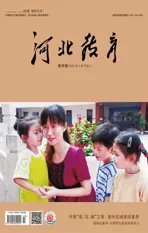把提问的自主权交给学生
——以My e-friend Story time教学为例
2021-12-29王爱琴
○王爱琴
阅读教学离不开问题引领,提问是深入解读文本的重要策略之一。教师要重视学生的自主提问,通过巧妙点拨,引发学生积极思考、主动探究,使他们真正成为课堂学习的主体。本文以My e-friendStory time 板块教学为例,探讨阅读教学中学生自主提问能力的有效培养。
一、读前引领提问
教师创设真实的语言情境,让学生自由地提问,师生之间的互动交流自然、和谐。
【教学片段一】
T: Nice to meet you,boys and girls. In this class,I want to know something about you first. Would you please tell me?
Ss: Of course.
(The teacher asks some questions about age,subiects and hobbies. The students answer the questions.)
T: Do you want to know something about me?These sentences maybe can help you.
(学生依据关键词提问,了解教师个人信息。)
S1: Are you good at singing?
T: No,I’m not. But I’m good at swimming.
S2: Do you like shopping?
T: Yes. I always go shopping at weekends.
S3: Can you cook well?
T: Just so so. I can cook vegetables well.But I can’t cook meat or fish well.
…
课始Free talk 环节,师生通过互动提问相互交流信息。在教师的话语激励和问题引领下,学生自主提问,了解自己最为关心的话题,自然而真实。这一引领性提问,为文本教学做好了充分预热与铺垫。
二、读中探究提问
阅读教学中,教师应有意识、有策略地培养学生的问题意识,鼓励他们敢于提问、善于思考,使思维活动逐步走向深入。
1.疑虑处提问。文本中的标题、插图等往往含有丰富的信息资源,教师对此加以利用,给学生设置一定的悬念,让他们提出自己感兴趣或关心的问题,从而调动其学习积极性。
【教学片段二】
T: Boys and girls,What do you want to know when you see this picture?
S1:Where are Liu Tao and Wang Bing now?S2: Why does LiuTao look happy?
…
T: Good questions. Let’s watch the cartoon and find the answers.
(The students watch the cartoon.)
T: Now please read and fill in the blanks.
Wang Bing is writing an e-mail to his e-friend in the computer room . Liu Tao comes in. He wants to play football with Wang Bing.
学生通过自己设疑、解疑的方式与文本进行了深入接触,在自主训练中提高了发现问题和解决问题的能力。
2.空白处提问。文本涵盖的信息往往不是单一、封闭的,而是留有空白,教师对此加以挖掘,让学生充分体验人物角色,加深文本内涵理解,进一步培养其自主思维能力。
【教学片段三】
T: If you are Liu Tao,how do you invite Wang Bing to play football?
S1: Wang Bing,do you want to play football with me?
S2: I want to play football. Do you want to join me?
…
T: Now you know Wang Bing has an e-friend,Peter. What questions do you want to ask Wang Bing about his e-friend?
S3: Where does Peter live?
…
T: How does Liu Tao ask Wang Bing in the story?Please read and underline in your book.
T: Read the questions together.
Ss: Does he live in London?What subjects does he study at school?Does he study Chinese?What does he usually do on Sundays?Does he play well?
由此,引出了本单元的新句型:一般现在时主语为第三人称单数形式的一般疑问句和特殊疑问句。以问题引领学生进入文本,不仅关注了文本的话语形式,还关注了话语内涵,有效提升了学生的问题意识。
三、读后拓展提问
文本学习经历了感知到理解后,还应进一步内化,以此培养学生的问题意识,实现从掌握到运用的转化,提升语用能力。
1.真实语境提问。学生在自然、真实的话语情境中,相互交换信息,自主交谈。
【教学片段四】
T: Wang Bing tells Liu Tao something about Peter. Do you know something about your deskmate’s friend?What’s your question and how to ask?
S1: Who’s your good friend?
S2: How old is he/she?
S3: Where does he/she live?…
学生利用问题自主交流,在此基础上进行综合语段输出,有效提升了语言综合运用能力。
2.模拟语境提问。通过图片、动画等媒体为学生创设模拟性的交际情境,学生在角色扮演中自主地进行话语交谈,根据自己感兴趣的话题进行提问。这一模拟情境中的提问,既关注了动词第三人称单数变化形式,又区分了特殊疑问句和一般疑问句,在巩固新语言句型的同时增强了学生的语用意识,发展了思维能力。在提问过程中,教师不可急于求成,而要学会等待,给学生留足空间和时间,以此保证他们思维的流畅性和发散性,学生的语言综合运用能力也得到提升。
